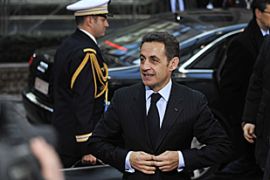Key EU summit under way
Leaders in Brussels to discuss climate change deal and EU-wide $263bn stimulus plan.

Climate divisions
Angela Merkel, Germany’s chancellor and chief architect of the original climate package, is under heavy pressure domestically to secure more concessions for German industry ahead of elections next year.
In a German newspaper interview earlier this week, she made clear she was prepared to be uncompromising in order to protect jobs after Europe’s biggest economy slipped into recession in the third quarter of the year.
“It must not take decisions that would endanger jobs or investments in Germany. I will make sure of that,” she told the Bild newspaper.
The EU’s climate-energy package, the so-called “20-20-20” deal, seeks to decrease greenhouse gas emission by 20 percent by 2020, make 20 percent energy savings and bring renewable energy sources up to 20 percent of total energy use.
Ban Ki-moon, the United Nations secretary general, who was attending UN climate talks in Poland, said the outcome of the summit in Brussels holds “great consequences for the whole world”.
Mixed messages
Addressing the issue of the economic stimulus plan as she arrived at the summit, Merkel said: “We support the view of the (European) Commission that we need to provide 1.5 per cent of GDP for the stimulus package to strengthen the economy.”
Repeating earlier suggestions Germany might first top up a national package worth $42bn, Merkel said: “Germany is aware of its responsibility as Europe’s biggest economy and Germany will also look at what we may have to do.”
Ahead of the summit, Peer Steinbrueck, Germany’s finance minister, had accused other EU states of “tossing around billions” as Berlin appeared to increase its resistance to demands to spend more to revive the EU’s economy.
In an interview with Newsweek magazine, Steinbrueck singled out Gordon Brown, Britain’s prime minister, for abandoning fiscal prudence and switching to policies that would saddle a generation with debt.
“The speed at which proposals are put together under pressure that don’t even pass an economic test is breathtaking and depressing,” Steinbrueck said in the interview, published on the magazine’s website on Wednesday.
“The same people who would never touch deficit spending are now tossing around billions.”
Although EU nations have backed most of the stimulus package proposed by the European Commission last month, Berlin has come under pressure to increase its national contribution and does not want to copy Britain in cutting value added tax (VAT).
Ireland
The only good news for Sarkozy appeared to be that Ireland was on the point of committing to put the EU’s controversial reform treaty to a new referendum after winning concessions that could assuage voters.
If confirmed, the decision would lead to a vote by October and pave the way for the Lisbon Treaty to take effect next year, ending a long period of damaging institutional limbo.
“The Irish government is committed to seeking ratification of the Lisbon Treaty by the end of the term of the current commission,” said a draft statement, prepared by ambassadors for EU leaders.
The mandate of the EU’s executive arm finishes at the end of October 2009.
Ireland, whose voters rejected the vast treaty of reforms in June, is constitutionally bound to ratify the text via a referendum.
All but one of the other 26 EU member nations have done so through parliament, with only the Czech assembly still considering the treaty.